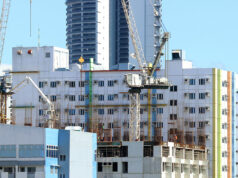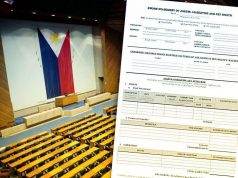MPIC takes ‘serious’ review as stocks fail to soar
By Denise A. Valdez, Reporter
METRO PACIFIC Investments Corp. (MPIC) needs a serious review of its business holdings amid a politically charged regulatory environment and declining investor enthusiasm in its asset class, company officials said.
After reporting a 69% surge in attributable net income to P23.9 billion in 2019, the listed infrastructure conglomerate said its earnings are evidently not translating to the performance of its share price.
Shares in MPIC closed P2.97 each on Wednesday, shedding nine centavos or 2.94%. It has been trading between P3.79 and P2.87 for the past 30 days.
“While we might attribute some of this to market factors and some to conglomerate discount, the discount (so we are advised) reflects concern on political developments,” MPIC Chairman Manuel V. Pangilinan was quoted in a Wednesday statement as saying.
Noting that the company have been asked about its outlook on investing in Philippine-regulated infrastructure, including means to raise capital to support such investments, he said it was difficult to provide an answer at the moment.
“There are no quick or easy answers to these questions but the current model of a listed infrastructure business with a wide pool of dedicated Philippine and foreign shareholders putting their faith in these long-term contracts needs serious review,” Mr. Pangilinan said.
“Meanwhile…, we are committed to completing our current projects while directing discretionary investment to warehousing, real estate and tourism,” he added.
MPIC is a majority investor in Maynilad Water Services, Inc., one of the two water concessionaires in Metro Manila that are being accused by President Rodrigo R. Duterte of benefitting from alleged “onerous” provisions in their concession contracts.
The holding company, which also controls power, tollroads, hospital and rail businesses, posted a core net income of P15.6 billion in 2019, up 4% from a year ago. System-wide revenues during the period stood at P424.1 billion, a 5% uptick from in 2018.
Substantial growth from power unit Manila Electric Co. (Meralco), increased traffic in domestic roads, and a higher number of patients in hospitals were key drivers of MPIC’s income.
The power business comprised 55% or P11.6 billion of MPIC’s net operating income. Tollroads accounted for 25% or P5.2 billion; water contributed 17% or P3.6 billion; and hospitals added 4% or P867 million. Other businesses such as rail and logistics posted a combined net loss of P352 million.
“Our 7% growth in contribution from operations reflects a decade and more of sustained capital investment to enable meaningful volume increases in all our major businesses,” MPIC President and Chief Executive Officer Jose Ma. K. Lim was quoted as saying.
But he noted the company’s expansion and “attempted constructive engagement on tariffs” with the government has not resulted favorably, as its various contracts are now being deemed as having onerous provisions.
Aside from Maynilad, the company also has long-pending tariff issues with the government through its tollroads unit Metro Pacific Tollways Corp.
“[T]he fall in our share price, along with the prices of other listed companies with government concessions, shows that despite our growth investors now attach sharply higher risk premiums for government adherence to contract,” Mr. Lim said.
He said this resulted in Maynilad’s inability to pay dividends, and MPIC recasting its investment program due to lower inbound cash flow, increased regulatory risk, and lack of investor enthusiasm.
“Ironically, even though there is huge demand for the services we provide, our discretionary investment spending beyond committed infrastructure projects will divert to less risky businesses like warehousing, real estate, and tourism,” he said.
MPIC has yet to announce its earnings and capital expenditure guidance for 2020 amid the uncertainties. But its board of directors approved a share buyback program of up to P5 billion until May 26.
It said the program might be triggered if the company’s stock is substantially undervalued, when there is high volatility in share prices, or there is any instance that would call for a buyback to improve shareholder value.
MPIC likewise reported operational highlights across its business units yesterday. Meralco’s core net income grew 6% to P23.8 billion due to a 6% increase in energy sales, lower borrowing costs and higher investment returns. Its power generation business, Global Business Power Corp., saw an 11% rise in core net income to P2.7 billion.
The tollroads unit posted an 18% increase in net income to P5.3 billion, driven by higher traffic in domestic roads and tariff adjustments in three expressways.
MPIC’s water business, operating through Maynilad and MetroPac Water Investments Corp., posted a total net income of P3.6 billion last year.
The hospital unit saw a 14% increase in core income to P2.7 billion, as it recorded an 11% increase in outpatient visits and 4% growth in inpatient admissions.
The rail segment, which operates the Light Rail Transit Line 1, contributed P319 million in MPIC’s core income.
“We will endeavor to at least match our 2019 Core Income in the year ahead, despite the challenges,” Mr. Pangilinan said.
MPIC is one of three Philippine subsidiaries of Hong Kong’s First Pacific Co. Ltd., the others being PLDT, Inc. and Philex Mining Corp. Hastings Holdings, Inc., a unit of PLDT Beneficial Trust Fund subsidiary MediaQuest Holdings, Inc., maintains an interest in BusinessWorld through the Philippine Star Group.



